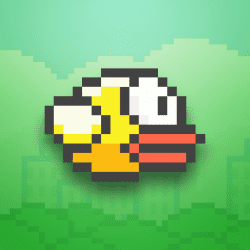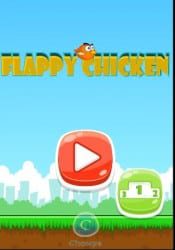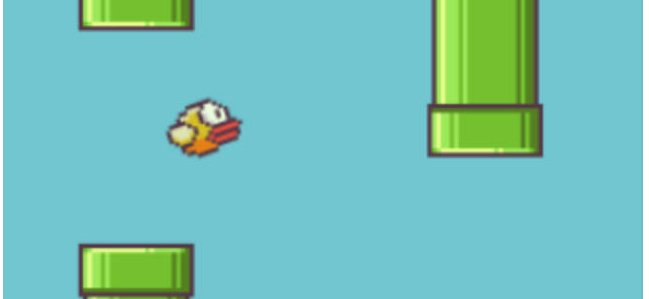What Flappy Bird Teaches Us About Content Creation
 Last week, almost everyone wanted to be in Dong Nguyen’s shoes.
Last week, almost everyone wanted to be in Dong Nguyen’s shoes.
An independent game developer from Vietnam, Nguyen had seemingly hit the jackpot. His game Flappy Bird had gone viral. It was atop both the iOS and Android app store free app list and, according to one estimate, was earning him some $50,000 per day in advertising (though Nguyen says the press was “overrating” the game’s success). He was an overnight phenomenon, finding fame and fortune all due to a simple game about a bird that flies through gaps between pipes.
Seemingly the only person that didn’t want to be in Nguyen’s shoes was Nguyen himself. On February 8th, Nguyen announced over Twitter that, the next day, he was taking Flappy Bird down. On the 9th, he went through with his promise.
Though it’s unknown exactly why Nguyen grew to dislike his successful game, his tweets paint the picture of a man who felt his game had gotten too popular, taking over both his life and the lives of many of his players, something he never wanted.
But while Flappy Bird is gone, it leaves behind many things. First,
chnology-science/technology/flappy-bird-copycats-rocket-up-3131235″>it leaves behind a wave of copycat games that are hoping to cash in on the success of the original. Next, it leaves behind an interesting case study in how a simple and nearly impossible game became a viral success. Finally, it leaves behind a unique case study in content creation and what it means to be a successful artist.
It’s the latter that we’re going to explore today.
Copyright: More Than Commercial
It’s easy to think of copyright as a commercial right. It’s what allows authors to sell copies of the books they write, musicians to license their songs to third parties and playwrights to sell tickets.
The stated purpose of copyright in the U.S. constitution is “To promote the Progress of Science and useful Arts” and commercial rights are certainly an important part of that. If an artist is reasonably likely to recoup their investment, they are more likely to spend the time, energy and money to hone their craft and create new works.
Likewise, if artists and those who support them can’t recoup their investments, creators will have to spend more time on other pursuits to make a living, giving them less time to practice and create.
But commercial gains are far from the only benefits creators seek out of a work. Future artists who pick up a pencil, a microphone or a camera are motivated by a slew of factors including name recognition, wanting to spread a message and even the simple desire to make something.
It’s unclear what motivated Nguyen when he sat down to make Flappy Bird. However, when it became a smashing success, it’s pretty clear that those desires were not being fulfilled. While he definitely intended to create a fun game, he had no interest in becoming wealthy off of it or, likely more importantly, having it overtake his life.
While the idea of a creator retracting a popular work may seem counter to the idea of promoting the progress of science and useful arts, that ability to do so may be one of the reasons why we got Flappy Bird (and other games by Nguyen) in the first place. In short, giving creators the comfort that they can control their work motivates them to release their creations and though some, like Nguyen, will pull back, many more won’t.
This is why it’s important that copyright not be exclusively about commercial rights and be about the artist exerting a reasonable amount of control over their creations. This is part of the reason why the proposed compulsory remix license is so controversial, while it may help many authors commercially, depending on the nature of the license, it takes other types of control that may mean more to the creator releasing the work.
Since we can’t possibly know why a particular artist created a work, we have to make sure that the artist has the ability to choose what happens with it. Whether that means limited commercial sales, widespread free distribution or something in between, the artist should have the choice and the law should enable that choice.
As Nguyen’s case shows, you can’t always predict why creators create, but you can give them the tools to make those reasons known.
The World Around Flappy Bird
 While Nguyen may be done with Flappy Bird and the spotlight it brought, the world isn’t. Not only have Flappy Bird clones been moving up in the app store rankings, but pirated copies of the game are widely available on file sharing and direct download sites. Many are even wondering if it’s acceptable to pirate the game since it is no longer legitimately available.
While Nguyen may be done with Flappy Bird and the spotlight it brought, the world isn’t. Not only have Flappy Bird clones been moving up in the app store rankings, but pirated copies of the game are widely available on file sharing and direct download sites. Many are even wondering if it’s acceptable to pirate the game since it is no longer legitimately available.
But while abandonware is a thorny issue that is best left to its own post, the fact remains many aren’t waiting to hash out the issues. There’s a strong demand for the game and plenty of developers that want to grab the money that Nguyen left on the table. While clone games have raised their own legal and ethical issues, copyright generally doesn’t protect game mechanics, which is what most of these games mimic.
While it’s no surprise that the vacuum left behind when Flappy Birds was removed is being attacked by various developers, what is interesting is that many of these games were in the store well before Flappy Bird left, or even before it was announced it would be leaving. Those that weren’t were almost certainly in development before then.
In short, most of these developers were trying to capitalize on the Flappy Bird craze before Flappy Bird was on the way out, meaning much of what we see today was set in motion well before Nuguyen made his decision.
This is important because many will wonder if Nguyen’s decision will create widespread cloning and infringement of his work. While it will certainly increase it, clearly, both of those were serious issues long before the game was pulled down.
In short, it was Flappy Bird’s success that brought the bulk of its clones and piracy, not its departure.
Bottom Line
To most of us, what Nguyen did seems almost crazy. To hit it big with a successful game and then to simply walk away with it because you don’t want to be an entrepreneur or want it to take over your life, seems to be against everything we know about artists and why they create.
But while Flappy Bird will probably wind up being another fad, much like Words with Friends, Dots and Temple Run before it, it will be remembered because it’s the one whose creator rejected the spotlight in favor of a different life.
We can’t predict what motivates content creators when they create new work and we certainly can’t hope to speak for all of them, all we can do is make sure that the law provides them the tools that, no matter what it is they want from their work, that they have a fair chance at achieving it.
There’s no easy way to do this, but as long as creators have choices, they will continue to find their own path to their own definition of success.
Want to Reuse or Republish this Content?
If you want to feature this article in your site, classroom or elsewhere, just let us know! We usually grant permission within 24 hours.
